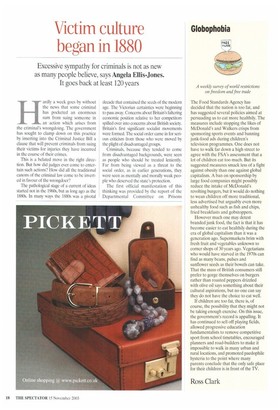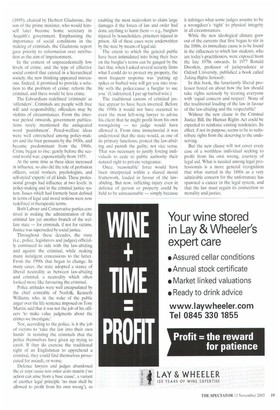Victim culture
began in 1880 Excessive sympathy for criminals is not as new as many people believe, says Angela Ellis-Jones. It goes back at least 120 years Hardly a week goes by without the news that some criminal has pocketed an enormous sum from suing someone in an action which arises from the criminal's wrongdoing. The government has sought to clamp down on this practice by inserting into the Criminal Justice Bill a clause that will prevent criminals from suing their victims for injuries they have incurred in the course of their crimes.
This is a belated move in the right direction. But how did judges ever come to entertain such actions? How did all the traditional canons of the criminal law come to be inverted in favour of the wrongdoer?
The pathological stage of a current of ideas started not in the 1960s, but as long ago as the 1880s. In many ways the 1880s was a pivotal decade that contained the seeds of the modern age. The Victorian certainties were beginning to pass away. Concerns about Britain's faltering economic position relative to her competitors spilled over into concerns about British society. Britain's first significant socialist movements were formed. The social order came in for serious criticism from those who were moved by the plight of disadvantaged groups.
Criminals, because they tended to come from disadvantaged backgrounds, were seen as people who should be treated leniently. Far from being viewed as a threat to the social order, as in earlier generations, they were seen as mentally and morally weak people who deserved the state's protection.
The first official manifestation of this thinking was provided by the report of the Departmental Committee on Prisons (1895), chaired by Herbert Gladstone, the son of the prime minister, who would himself later become home secretary in Asquith's government. Emphasising the importance of social conditions in the making of criminals, the Gladstone report gave priority to reformation over retribution as the aim of imprisonment.
In the context of unprecedentedly low levels of crime, and the type of effective social control that existed in a hierarchical society, the new thinking appeared innocuous. Indeed, it promised to provide a solution to the problem of crime: reform the criminal, and there would be less crime.
The Edwardians redefined 'criminals' as 'offenders'. Criminals are people with free will and responsibility; offenders may be victims of circumstances. From the interwar period onwards, government publications rarely mentioned the antiquated word 'punishment'. Penal-welfare ideas were well entrenched among policy-makers and the bien pensants by the 1930s, and became predominant from the 1960s. Crime began to rise: gently before the second world war, exponentially from 1955.
At the same time as these ideas increased in influence, so also did the role of probation officers, social workers, psychologists, and self-styled 'experts' of all kinds. These professional groups had influence at two levels: in policy-making and in the criminal justice system. Issues which had formerly been defined in terms of legal and moral notions were now redefined in therapeutic terms.
Both Labour and Conservative parties connived in making the administration of the criminal law yet another branch of the welfare state — for criminals, if not for victims. Justice was superseded by social justice.
Throughout these decades, the state (i.e., police, legislators and judges) officially continued to side with the law-abiding and against the criminal, while making many indulgent concessions to the latter. From the 1990s that began to change. In many cases, the state adopted a stance of liberal neutrality as between law-abiding and criminal, a neutrality which often looked more like favouring the criminal.
Police attitudes were well encapsulated by the chief constable of Norfolk, Kenneth Williams, who, in the wake of the public anger over the life sentence imposed on Tony Martin, said that it was not the job of his officers to make value judgments about the crimes we investigate'.
Nor, according to the police, is it the job of victims to 'take the law into their own hands' in resisting the criminals that the police themselves have given up trying to catch, If they do exercise the traditional right of an Englishman to apprehend a criminal, they could find themselves prosecuted for assault, or worse.
Defence lawyers and judges abandoned the ex ttupi causa non on-tur actio maxim ('no action can arise from a base cause', a variant of another legal principle 'no man shall be allowed to profit from his own wrong'), so
enabling the most malevolent to claim large damages if the forces of law and order had done anything to harm them — e.g., burglars injured by householders, prisoners injured in prison. All of these cases were underwritten by the state by means of legal aid.
The extent to which the general public have been intimidated into living their lives on the burglar's terms can be gauged by the fact that, when I asked several security firms what I could do to protect my property, the most frequent response was 'putting up spikes or barbed wire will get you into trouble with the police/cause a burglar to sue you. {Undeterred, I put up barbed wire,) The traditional canons of criminal justice appear to have been inverted. Before the 1990s it would not have occurred to even the most left-wing lawyer to advise his client that he might profit from his own wrongdoing — no judge would have allowed it. From time immemorial it was understood that the state would, as one of its primary functions, protect the law-abiding and punish the guilty; not vice versa. That was necessary to justify forcing individuals to cede to public authority their natural right to private vengeance.
Once. 'reasonable' force would have been interpreted within a shared moral framework, loaded in favour of the lawabiding. But now, inflicting injury even in defence of person or property could be held to he unreasonable — simply because it infringes what some judges assume to be a wrongdoer's 'right' to physical integrity in all circumstances.
While the new ideological climate grew out of the currents that first began to stir in the 1880s, its immediate cause is to be found in the influences to which law students, who are today's practitioners, were exposed from the late 1970s onwards. In 1977 Ronald Dworkin, professor of jurisprudence at Oxford University, published a book called Taking Rights Seriously.
In this book, the luxuriantly liberal professor bored on about how the law should take rights seriously by treating everyone with 'equal concern and respect'. None of the traditional loading of the law in favour of the law-abiding and the respectable!
Without the new clause in the Criminal Justice Bill, the Human Rights Act could be expected to reinforce existing tendencies. Its effect, if not its purpose, seems to be to redistribute rights from the deserving to the undeserving.
But the new clause will not cover every case of a worthless individual seeking to profit from his own wrong, courtesy of legal aid. What is needed among legal professionals is a more general recognition that what started in the 1880s as a very admirable concern for the unfortunate has spawned a cancer in the legal system, and that the law must regain its connection to morality and justice.



























































































 Previous page
Previous page